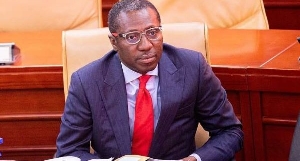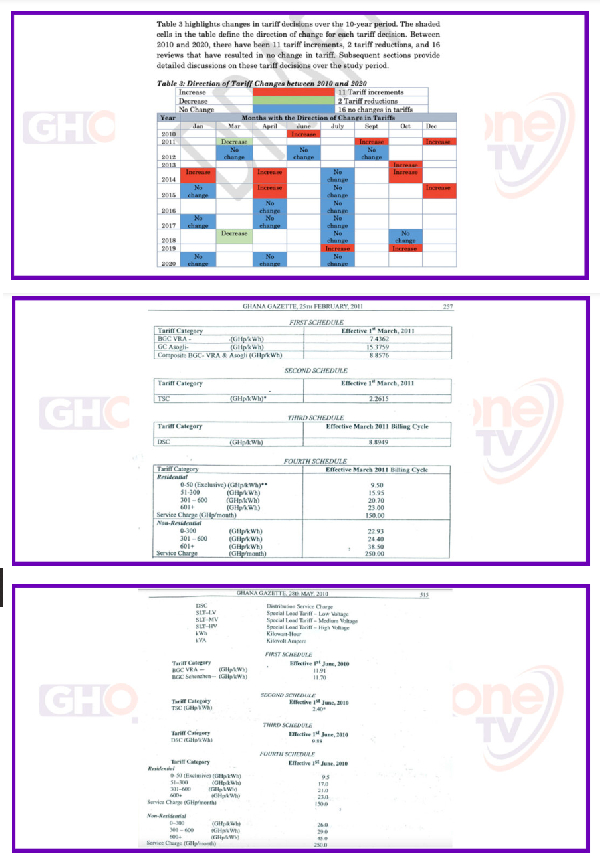 Alexander Kwamina Afenyo-Markin, the Majority Leader
Alexander Kwamina Afenyo-Markin, the Majority Leader
From July 1, 2024, electricity and water consumers in the country are expected to pay more to enjoy their utilities.
The Public Utilities Regulatory Commission (PURC) announced on May 31 that while lifeline consumers (0-30 kWh) will have their tariffs going up by 3.45%, all other residential consumers will experience a 5.84% increase in their tariffs.
The industrial category is set to experience an increase in electricity tariffs of 4.92%. Water tariffs, on the other hand, will increase by 5.16% for all customer classes.
As there have been increased calls for the government to present practicalized actions aimed at alleviating what could be described as the worsening cost of living, Majority Leader Alexander Kwamena Afenyo-Markin sought to highlight some actions of this government that he believes make them heads above previous administrations.
CLAIM
Speaking on the floor of parliament on Tuesday, June 11, the MP for Effutu made this claim.
“This government acknowledges that our people face various forms of challenges. It is in light of this that history will remember this government as the only government in the 4th Republic to reduce electricity tariffs.
"In 2018, the government of Ghana announced various tariff reductions ranging from 18 to 30 percent. It is a matter of record, and this has never happened in the history of Ghana.”
According to the leader, “This NPP government is the only government in the 4th Republic to reduce electricity tariffs!”
But how factual is this claim?
FINDINGS
Ghana in the 4th Republic, up until its recent International Monetary Fund (IMF) deal that included an agreement for the enforcement of a quarterly adjustment of utility tariff structure, has traditionally practiced an annual major tariff review system.
The current government, which began its mandate in January 2017, during the 2018 budget reading in November 2017, disclosed its plan to “realign electricity tariff structure with government’s developmental goals of industrial transformation, growth, and job creation,” promising a reduction in electricity tariffs come 2018.
True to its word, on March 5, 2018, the PURC announced a reduction in electricity tariffs to take effect from March 15th, 2018. The announcement included a 17.4% reduction for residential customers and a 30% reduction for non-residential customers.
It is, therefore, a matter of fact that this government in 2018 announced an up to 30% reduction in electricity tariffs.
Additionally, amidst the rollout of the quarterly adjustment tariff review structure of the PURC, the commission in the fourth quarter of 2023 announced a marginal 1.52% reduction in electricity tariffs.
The commission also, most recently, in February 2024 announced a downward adjustment of 6.56% and 4.98% in the cost of electricity tariffs for residential and non-residential consumers, respectively, for three months with effect from April 1, 2024.
These adjustments further emphasize the fact that electricity tariffs have seen a reduction under this government. But the question remains: Is this government the only government in the 4th republic to reduce electricity tariffs?
The answer lies in the records of the Public Utility Regulatory Commission.
Data available on the website of the commission (purc.com.gh) provides a gazette of the various tariff adjustments since 1998.
Between 1998 and 2010, utility tariffs saw a consistent rise with occasional stability in prices.
However, in February 2011, the PURC announced a downward review of electricity and water tariffs from March 1 to May 31 in accordance with its revised Automatic Tariff Adjustment Formula (AAF).
For the period under review, residential consumers within the 51-300 units bracket experienced a 6.2% reduction, paying 15.95 pesewas per kilowatt hour, down from 17 pesewas it was in June 2010, while those in the 301-600 bracket were to pay 20.7 pesewas, down from 21 pesewas.
Non-residential consumers also, on average, benefitted from a 14.17% reduction in the February 2011 adjustment.
The reduction is also confirmed by a February 16, 2011 online publication by the Ghana Business News…
Finally, a December 2020 publication by the research department of the PURC analyzing the trends in electricity tariffs in Ghana between 2010 and 2020 on page 6 highlights this as its findings on changes in tariffs within that period.
“Between 2010 and 2020, there have been 11 tariff increments, 2 tariff reductions, and 16 reviews that have resulted in no change in tariff.”

VERDICT
Considering this government began its stewardship on 7th January 2017, and our findings from PURC’s available data prove there was indeed a tariff reduction in 2011 when this government was not yet in office, the claim by the Majority Leader and MP for Efutu, Alexander Afenyo-Markin, that “This government is the only government in the 4th republic to reduce electricity tariffs” is FALSE.